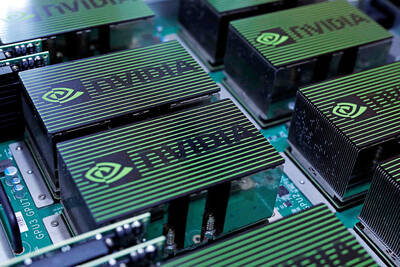British mobile phone giant Vodafone announced on Wednesday that it would start selling Google’s Nexus One smartphone in Britain within the next few weeks, with France and Germany likely to follow.
The touch-screen device, launched on Tuesday and produced in collaboration with Taiwanese electronics maker HTC (宏達電), poses a direct challenge to Apple’s top-selling iPhone.
“I can confirm that Vodafone is the first operator to partner with Google to offer the Nexus One in Europe, starting soon in spokeswoman for Vodafone said.
“No detail on pricing and precise timing has yet been made, but that will come in a few weeks,” she said.
Customers will be able to purchase a subsidized Nexus One phone with a Vodafone contract. The device will also be available directly through the Google Web store.
Google said earlier it had reached “strategic partnerships” with telecom firm Verizon in the US and Vodafone in Europe.
Vodafone said on Wednesday that the group was in talks to sell the Nexus One in France, Germany and other European countries this year.
“We’re in early discussions with Google to introduce the offer in France [through SFR] and in Germany and Spain, and more European countries are expected during 2010,” the spokeswoman said.
“Our agreement with Google stretches beyond Europe — all Vodafone’s geographies — and over time we will be working to provide offers in other Vodafone operating countries,” she said.
Separately, rival O2 said it was closely following developments over the Nexus One handset.
“We have been following Google’s announcement with interest,” said a spokeswoman for O2, which is the British division of Spanish telecoms group Telefonica.
“We welcome innovation in our industry and have already seen devices such as the Apple iPhone and Palm Pre have a huge effect on the way people use their mobile phones,” the spokeswoman said.

Leading Taiwanese bicycle brands Giant Manufacturing Co (巨大機械) and Merida Industry Co (美利達工業) on Sunday said that they have adopted measures to mitigate the impact of the tariff policies of US President Donald Trump’s administration. The US announced at the beginning of this month that it would impose a 20 percent tariff on imported goods made in Taiwan, effective on Thursday last week. The tariff would be added to other pre-existing most-favored-nation duties and industry-specific trade remedy levy, which would bring the overall tariff on Taiwan-made bicycles to between 25.5 percent and 31 percent. However, Giant did not seem too perturbed by the

AI SERVER DEMAND: ‘Overall industry demand continues to outpace supply and we are expanding capacity to meet it,’ the company’s chief executive officer said Hon Hai Precision Industry Co (鴻海精密) yesterday reported that net profit last quarter rose 27 percent from the same quarter last year on the back of demand for cloud services and high-performance computing products. Net profit surged to NT$44.36 billion (US$1.48 billion) from NT$35.04 billion a year earlier. On a quarterly basis, net profit grew 5 percent from NT$42.1 billion. Earnings per share expanded to NT$3.19 from NT$2.53 a year earlier and NT$3.03 in the first quarter. However, a sharp appreciation of the New Taiwan dollar since early May has weighed on the company’s performance, Hon Hai chief financial officer David Huang (黃德才)

UNPRECEDENTED DEAL: The arrangement which also includes AMD risks invalidating the national security rationale for US export controls, an expert said Nvidia Corp and Advanced Micro Devices Inc (AMD) have agreed to pay 15 percent of their revenue from Chinese artificial intelligence (AI) chip sales to the US government in a deal to secure export licenses, an unusual arrangement that might unnerve both US companies and Beijing. Nvidia plans to share 15 percent of the revenue from sales of its H20 AI accelerator in China, a person familiar with the matter said. AMD is to deliver the same share from MI308 revenue, the person added, asking for anonymity to discuss internal deliberations. The arrangement reflects US President Donald Trump’s consistent effort to engineer

NVIDIA FACTOR: Shipments of AI servers powered by GB300 chips would undergo pilot runs this quarter, with small shipments possibly starting next quarter, it said Quanta Computer Inc (廣達), which supplies artificial intelligence (AI) servers powered by Nvidia Corp chips, yesterday said that AI servers are on track to account for 70 percent of its total server revenue this year, thanks to improved yield rates and a better learning curve for Nvidia’s GB300 chip-based servers. AI servers accounted for more than 60 percent of its total server revenue in the first half of this year, Quanta chief financial officer Elton Yang (楊俊烈) told an online conference. The company’s latest production learning curve of the AI servers powered by Nvidia’s GB200 chips has improved after overcoming key component